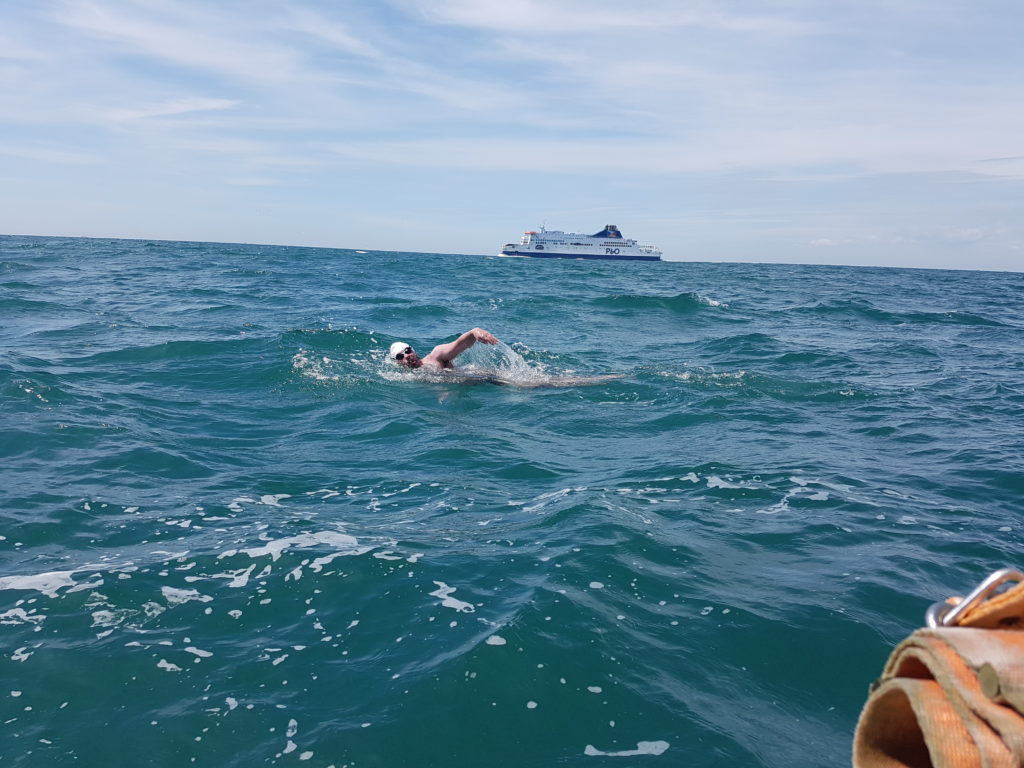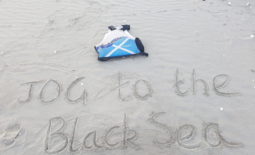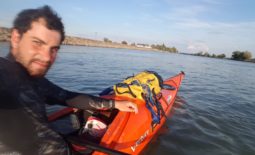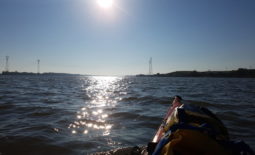Swimming the English Channel
All official Channel swims start from the beaches of Dover and at 7.05am I began mine. In every single cold water training swim I did, I entered the water with a wince, with a brief thought of sneaking out of the water and back into the warmth without anyone noticing. Today however, there were no such thoughts, I don’t think that the water was any warmer than it had been in the past few weeks, but I just didn’t feel that the water was cold, this wasn’t the time to be feeling cold, this was the big one!
I immediately started swimming towards my support boat which was stationed a couple of hundred metres off shore. It was a beautiful morning, the sun was glistening and the water was as smooth as glass, a perfect day for a 13 hour swim. My support team consisted off my parents, Maria, the observer Keith, the pilot Eric and co-pilot Gary, I approached the boat and we were off.
We had agreed to a feeding pattern of food and drinks every hour and drinks every half an hour after the first two hours (makes sense?). The first hour passed so quickly that I thought my team had made a mistake and were stopping me after only half an hour. The main aspects that retained my attention through the first hour were that my goggles were leaking slightly, ensuring that I had to keep my left eye closed for almost the whole hour and the warm messages of support that I was receiving that were being relayed to me using a whiteboard from the boat.
The second hour passed just as smoothly, this time without any goggle issues, the water was still extremely calm and I was feeling strong and most importantly, warm. After this, the breaks changed to every half an hour, which if for nothing else provides a nice target to aim for. Mentally it can be extremely draining thinking about the 13 hour swim that you have ahead, simply thinking about the next 30 minutes is much more manageable. You just need to ask yourself “can I swim another 30 minutes?”, the answer will be yes, then just repeat this until you reach France, easy.
My support team were doing a great job, in fact, their account of the swim is probably a lot more interesting than mine. Maria was doing an amazing job of cheerleading and also keeping everyone updated online with videos and updates. Simply having Maria on board was inspiration enough, how could I not keep swimming with someone like that watching me? Mum was in charge of the feeding, with timing of the feeds a key issue, it was paramount that they went without hitch and bar none, they all did. Dad had unfortunately succumbed to the dreaded sea sickness early on and never recovered. I occasionally saw his head appear at the side of the boat for a brief instance before he submerged back into his bean bag of despair. Sea sickness is extremely common, particularly for the people on the boat. The Channel can be tremendously choppy and travelling at swimming speed in very conducive for sea sickness.
The swim was going well, the swimming pool esq conditions that I experienced for the first hour were slowly waning, replaced instead by increasingly large rolling waves. At the four hour feed, Eric came out and asked if I could try swim a little bit faster. This was not an attempt by Eric to simply get home quicker to not miss his dinner, his encouragement was instead concerned that the tide was pushing us up the Channel a little bit, swimming a bit faster would negate this, potentially reducing the swim by several hours. I upped my pace a little bit, but upping it considerably is simply not possible when you probably have over 10 hours more to swim. The waves began to increase in size, I thought this was due to the fact that we were now entering the shipping lanes. The English Channel is one of the busiest shipping lanes in the world, the centre part acting almost like a motorway where one lane has ships going left to right and the other lane right to left. I only briefly caught a glimpse of the mountainous vessels, my attention remained on the little boat to my left.
Little did I know, but concerns were mounting on the boat. The weather was turning nasty and only forecasted to get worse. The only other solo swimmer out that day had turned back after two hours, the other two boats were both relay teams, travelling significantly faster than I was. At the seven hour feed, Eric once again came out and explained the situation. With the tides, we had drifted quite far up the Channel. The tide was just about to change, meaning that we would be travelling back down the Channel, against the wind. However, because we had drifted up the Channel further than planned, the tide would not take us back down far enough before it changed again, meaning that I would be swimming well into darkness before reaching France became remotely possible. This would not normally be an issue, if the swimmer is going strong (which I was), then the pilot will not pull them out of the water unless the swimmer or the people on the boat are in danger. The waves had been growing steadily in aggression and were not causing the situation to become dangerous. A couple of times, my hat and goggles were almost completely removed by their power. Eric gave me the option, I could keep swimming, with the knowledge that it would be well into darkness, probably back into the light before we reached France and even then it would probably be too dangerous to land or I could retreat to the boat. I kept swimming.
A short time after this, Eric again appeared from the cabin and signalled me over to the boat. The waves were now so strong that even getting close enough to the boat to hear him was a struggle. Honestly, I didn’t need to be close to the boat, I knew what he was going to say, my swim was over.
For the first time since leaving the beach at Dover, I looked forwards towards France, it seemed the coast was in touching distance. Again it took several strokes to get to the boat, this time however, I went to the back of the boat and climbed in, I was into French waters, but I had failed to cross the Channel. Eric explained the situation once more, it wasn’t until I got onto the boat that I realised how big the waves actually were. In the final half an hour or so it had become a bit of a struggle to stay close to the boat, not a huge issue in the day time, but could’ve become hazardous at night. Everyone on board were incredibly supportive and in amazingly good spirits considering they had been battered by the waves for hours. One last look at France and we headed back to England.
On the way back, I told myself to remember this feeling, remember what it feels like to get back on this boat without reaching the other side. Even though it wasn’t strictly under my control this time, I will remember this feeling, so that the next time I am out there, it will be with me, powering me through the inevitable pain.
Preparing for an event for so long can be extremely mentally draining and not succeeding meant that the following few days were extremely tough. One of the main reasons I wanted to take on this challenge was because I wanted to push myself to my absolute limits, both physically and mentally. It is something that I’ve never done before and I wanted to prove, mostly to myself, that I was capable of going beyond my limits, through pain and arrive at the other end, stronger. My frustration was that factors out with my control meant that this was not possible, if I had tried and failed, then at least I’d know, at least I’d have given it my all and could accept that this time, it wasn’t enough. To be pulled out of the water when things were still going fine, nowhere near my limitations, was extremely frustrating.
Channel swimming is so popular that you have to book a slot at least a year in advance, sometimes two. For this reason, if you don’t make it across, it isn’t just a case of coming back next week for another go. Most swimmers have to wait at least another year. Thankfully, Eric is extremely reasonable, appreciating that the failed attempt wasn’t my fault and has offered me another chance at the end of the season. Looks like I can’t put away those speedos just yet, I’ll be needing them again in a couple of months.
I will cross the English Channel; I will not stop trying until I do. For now, however, it’s goodbye to Dover, the JOG continues, now where’s that bike?




July 26, 2016 @ 9:00 pm
Feel free to leave comments, compliments, suggestions or insults.